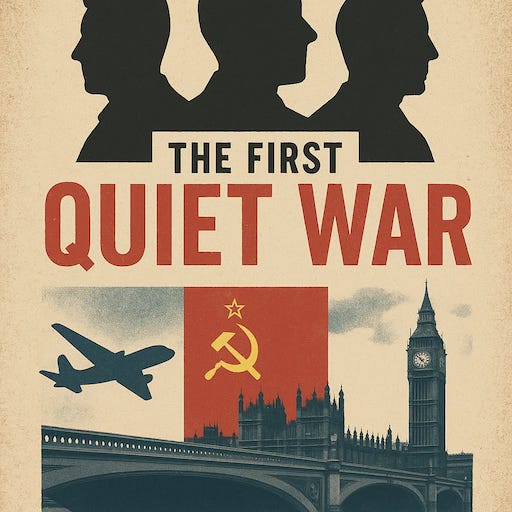📖 The First Quiet War
“Let them believe they’ve won. That’s when the real theft begins.”— Kuznetzov, 9 November 1989
INT. EAST BERLIN – BORNHOLMER STRASSE WATCHTOWER, NIGHT
Above the crackling fireworks and crowd-howl, three men sat around a battered metal table in a watchtower that smelled of tobacco, iron, and reheated betrayal. Vodka bottles lined the sill, one toppled near a greasy sausage, a toothpick with a Lenin bust impaled through a slice of pickle.
Mikhail Kuznetzov leaned out the window. He scanned the floodlit checkpoint below like a hawk eyeing a field of frightened rodents. On the street: chaos disguised as liberty. East Berliners pressed against the gates, some weeping, some laughing, most simply stunned. A few held flowers. Others held back.
He grinned, then turned to the men behind him.
“Comrades, the first phase is progressing well.”
He raised his glass — ceremonial, if half-facetious.
“It can’t be stopped. And it won’t be random. We’ll guide each tremor — right to the heart of London.”
Pavlov sat opposite. He wasn’t smiling. Unlike Kuznetzov, he understood the price of control — and that it rarely came with clarity.
“Wonder if the aristocrat managed to give the shits to the Brits.”
Kuznetzov barked a laugh.
“Keane won’t be shaken. The lad wrote a doctorate on how we Russians play the long game.”
Pavlov downed his vodka, muttered:
“He’s still up to something. He mentioned... recordings. From cultural evenings. That caught my ear.”
Kuznetzov smirked.
“Let them believe they’ve won the Cold War. We’ll exploit their hunger. Their avarice. Their naïve belief in permanence.”
He refilled both their glasses.
“Their inability to balance blood flow between brain and genitals.”
That line pulled a slow chuckle from the third man — Patrick Maloney.
Maloney looked tired in the way only a professional fixer can be. Irish, suntanned, ex-mercenary, his passport held more stamps than truths.
“Thanks for setting the trap,” Kuznetzov said, offering him a respectful nod.
Maloney shrugged.
“Pleasure. Just keep the money flowing. You’ll find the Irish are reliable when there’s drink and revenge in the budget.”
He reached for the sausage, tore a piece with fingers that had once held detonators in Angola.
Pavlov leaned back.
“We should talk about what comes after. Charles is smart, but he isn’t the only one watching.”
Kuznetzov nodded.
“True. But Charles plays chess. We’re playing katorga.”
He stood again, this time lifting a folder from under the table — creased, with Cyrillic lettering and a red wax seal.
“Triple Edge is no longer a strategy,” he said. “It’s a state of mind.”
Maloney raised a brow.
“Catchy. You write that one yourself?”
Pavlov cracked a half-smile.
“He has a poet’s vanity.”
Kuznetzov shrugged.
“Better than having a conscience.”
A long silence followed.
Below them, the shouts grew louder. The wall had cracks now. Figurative ones, but real enough. A young girl was lifted over by strangers. An old man sat down and cried into his coat.
Maloney broke the quiet.
“You really think you’ll control it? This... collapse?”
Kuznetzov didn’t blink.
“We won’t control the collapse. Just its aftermath.”
He turned to the window again.
“This is just the first quiet war.”
.




